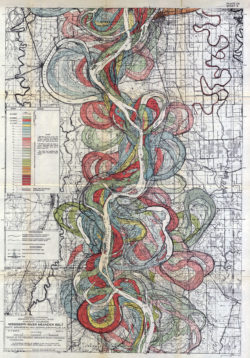About
About the Project
This is the site for Scott McLaughlin's AHRC-funded leadership fellowship ‘The Garden of Forking Paths’ which was funded from Aug 2019 to Jan 2021. Postdoctoral researcher on the project is Alex De Little. Contact Scott for details.
The project is practice research in music composition for clarinet(s). The main outputs were (1) compositions (scores and recordings) for solo and duo clarinets, including studies and concert works, and (2) video tutorials and writings about composing and performing with the material agencies of the clarinet.
The project title is borrowed from Borges’ wonderful short story of the same name.

Image: Historical courses of the Mississippi river
The image to the right is a useful metaphor to begin explaining the project: see here for origin. It shows the meanders of the Mississippi river across the 18th–20th centuries, and the remnants of older meanders. A river is a dynamic process, always co-constituted by its own materiality and the matter of the surrounding land. Often (in geological time at least), the river currents flood when the bank is overwhelmed by water. When the waters then recede, the river may return to its old bed, or the waters may find another stable path through nearby ground. Each time it happens it reroutes a section of the river. Sometimes it may switch between a couple of strong beds, while at other times it may find a completely new bed. Over time get a picture of the different possibilities of that landscape and water. The same behaviour can be seen here in the much smaller context of water flowing down a bath. Such dynamic interaction of flow and materiality is at the heart of my project, but in the domain of sound, where continuous sound can move between stable and unstable behaviours in ways that offer interesting compositional possibilities.
This project explores different strategies for composing music where the instrument leads the player, ultimately allowing the instrument to define the moment-to-moment unfolding of the music in performance. This project focusses on the clarinet, which—like most instruments—is inherently unstable but over years of training a player learns how to navigate using different techniques to deal with different types of instability: compare playing chalumeau to altissimo. These instabilities are a window for non-human agency to be allowed in. Of course the instrument is designed to play traditional ‘musical’ sounds, for the sake of argument let’s call these ‘sounds that humans want to make’. In addition to this, there are a wide range noise-sounds and pitch-timbre complexes (e.g. multiphonics) that traditional clarinet pedagogy weeds-out, let’s call these ‘sounds the clarinet wants to make’. Obviously this is a gross simplification of agency, but for the moment, allow the dichotomy to stand as a potentially productive lie that affords the following question: what happens if we give the clarinet more agency than the human, allow the clarinet to make “its” sounds? This is the starting-point for my project.
There are several simple answers to this question, but none that systematically address the question of developing compositional strategies from an agential perspective. Closest to this is probably the approach of improvisors such as John Butcher who have explored similar ideas in very fruitful ways through improvisation. In the compositional world—porous as the divide here may be—these kinds of sounds in themselves are now ubiquitous in new-music and experimental music, with composers using them in different ways across a continuum from “sound effects” through to a careful and nuanced manipulation of the sounds. However, for all this common use of unstable and non-standard sounds, the dominant paradigm is that of control, wherein the composer defines a sound and the performer strives to produce it accurately every time. My project takes the other path to ask what compositional possibilities are opened-up if we replace control with ‘support’? If rather than defining specific sounds, the composer’s role is to create a system where the player is always responding to the preferences of the instrument, allowing it lead her through the labyrinth of its sonic complexities. I will compose multiple pieces for one and two clarinets that outline a variety of strategies and notations. All of which is documented rigorously and continuously online to maximise public engagement.
The project is designed ‘laboratory-style’, built around close collaboration with specialist clarinettist Heather Roche, and a group of other clarinettists as duet partners along the way. This work was further supported by acoustician Prof David Sharp (The Open University). In addition to this, there was a ‘shadow project’—updated here—running with partners the RNCM (Royal Northern College of Music) in Manchester. As the research developed it was passed to RNCM composers and clarinettists (staff and students) who developed it in their own way, forking their own paths from it.
